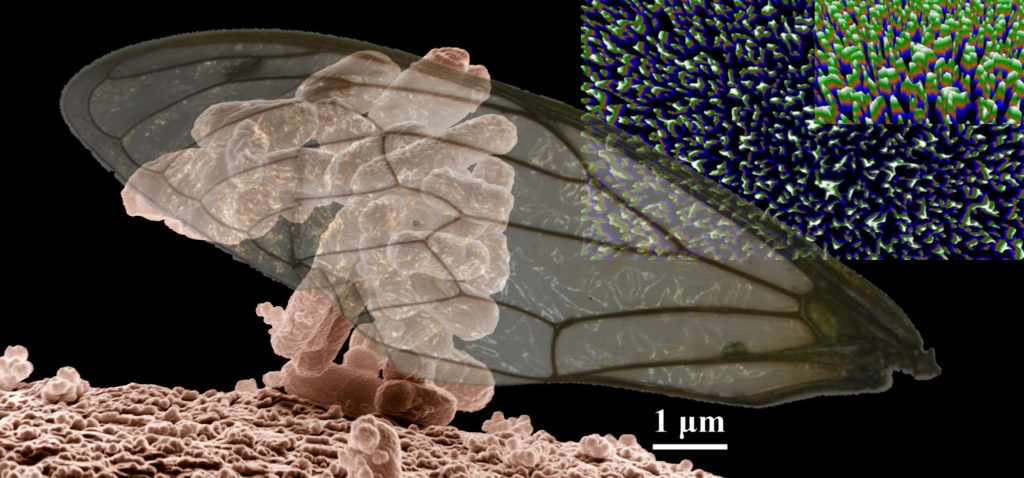Fighting Superbugs: Biomimetic Nanostructures

Professor Elena Ivanova
Professor of Nanobiotechnology, College of Science, Engineering & Health, RMIT University
The threat of a global rise of untreatable infections caused by antibiotic-resistant bacteria calls for the design and fabrication of a new generation of biomaterials. Following the discovery of the efficient, bacteria-killing nature of insect wing surfaces, the properties of these biological nanostructures have recently become the subject of intense investigation, promising to play a large role in combatting the emerging, worldwide epidemic of “super-bugs.”
The formation of pathogenic bacterial cultures in clinical settings has been prevented for many years through adaptating the physical and chemical properties of a variety of medical tools, particularly the surfaces of instruments and implants. This “micro-nano” scale control has led to greater regulation of bacterial attachment and biofilm formation. These “anti-befouling” surfaces generally rely on a chemical coating that slowly releases a “biocidal” agent, killing the bacteria that come into contact. However, these biofilm-forming bacteria can adapt, and may develop resistance over prolonged periods of exposure, leading to an unwelcome increase in antibiotic resistance in pathogenic strains of bacteria.
Recent studies of cicada wings have shown that they are covered with nano-pillared arrays lethal to most species of pathogenic bacteria. Rather than relying on a combination of physical and chemical properties to combat biofilm formation, the mechanism of the antibacterial activity of nanostructured surfaces has been described in terms of purely physical, “mechano-bactericidal” effects. Recently, “black silicon” was synthesised to simulate an insect wing’s protective surface, inducing a similar biocidal effect that physically ruptured the small, gram-negative bacteria cells while leaving the host’s much larger, eukaryotic cells intact; however, the precise role of this and other nano-architectures in fighting pathogenic bacteria remains a complex mystery to be solved.
About the Speaker:
 Professor Elena P. Ivanova is a molecular biochemist whose professional interests are concentrated on development and coordination of collaborative research in fundamental and applied fields of nanobiotechnology. With a globe-trotting career that has taken her from the Ukraine and Russian Federation to Japan, the UK, France and finally Australia, she is the recipient of several international awards, including the Morrison Rogosa Award, American Society for Microbiology (1999), UNESCO Biotechnology Fellowship (1997), and the AIST Fellowship, Japan, Foreign Researcher Invitation Program of the Agency of Industrial Science and Technology, (1994-1997). In 2017 she was awarded the prestigious UNSW Eureka Prize for Scientific Research for her research leadership in the fight against the growing epidemic of antibiotic resistant bacteria. Elena has been based at the Swinburne University of Technology since 2001, and in 2018 commences a new position as Professor in Nanobiotechnology with the College of Science, Engineering and Health at RMIT University.
Professor Elena P. Ivanova is a molecular biochemist whose professional interests are concentrated on development and coordination of collaborative research in fundamental and applied fields of nanobiotechnology. With a globe-trotting career that has taken her from the Ukraine and Russian Federation to Japan, the UK, France and finally Australia, she is the recipient of several international awards, including the Morrison Rogosa Award, American Society for Microbiology (1999), UNESCO Biotechnology Fellowship (1997), and the AIST Fellowship, Japan, Foreign Researcher Invitation Program of the Agency of Industrial Science and Technology, (1994-1997). In 2017 she was awarded the prestigious UNSW Eureka Prize for Scientific Research for her research leadership in the fight against the growing epidemic of antibiotic resistant bacteria. Elena has been based at the Swinburne University of Technology since 2001, and in 2018 commences a new position as Professor in Nanobiotechnology with the College of Science, Engineering and Health at RMIT University.
Full RSV Members: to attend this lecture, please register to attend our Annual General Meeting that precedes it. Meanwhile, RSV student members and non-members can register for the lecture below.






